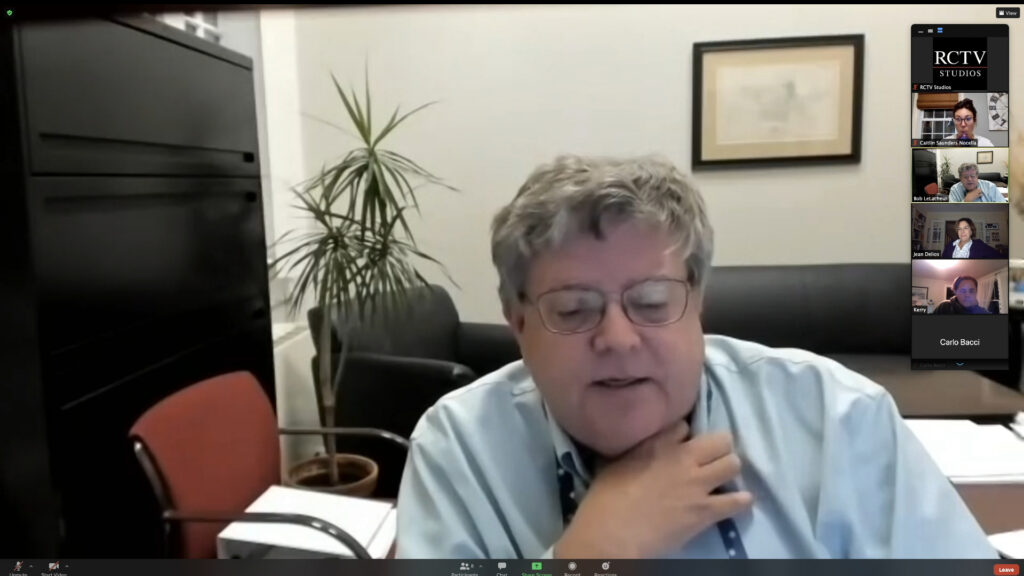
Reading, MA — Director of Public Works Jane Kinsella advised the Select Board regarding water and sewer bills on October 6. This update resulted from several communications received by the board from residents questioning the amount of their bills. Kinsella shared that three “buckets” make up the water and sewer bill: the Massachusetts Water Resources Authority (MWRA) assessment, wages and overhead, and capital and debt expenses. Typically, according to Kinsella, Reading has had a two percent annual drop in usage, but this year use is up 27% over last year in the same period. The increase is attributed to more residents staying home during the COVID-19 shutdown and a warmer than average summer. Kinsella explained that this increased usage is the primary reason for larger-than-average bills this quarter.
When questioned why Reading has some of the highest rates in the region, Town Manager Robert LeLacheur explained that some other communities have a graduated rate between residential and commercial customers, reducing residents’ costs. Some communities also paid for water upgrades and the MWRA joining fee using debt exclusions, which are then added to tax bills, where Reading chose to pay for these out of the water rates. The MWRA buy-in will be paid off in Fiscal Year 2028.

LeLacheur also reminded the board that the new water and sewer rates, which were voted on in June, will not take effect until the next bill. These new rates feature a 3.2% increase in water rates, but a 3.0% decrease in sewer rates, meaning the combined rate will be approximately the same as this past year.
Continuing, LeLacheur reminded the board that Reading takes a proactive approach to the maintenance of its water system, rather than waiting for something to fail. “We still have some water mains that are over 100 years old,” Kinsella reported.

Chief Appraiser Victor Santaniello reported that 176 applications for senior tax relief were approved, resulting in an average tax savings of $1,580 for those applicants. In total, $270,300 of relief was granted. Santaniello also gave a “top sheet” presentation on tax classification for the board. Reading has a total assessed value of $5.7 billion, which will create a tax levy of just under $79 million. The board will receive a full presentation by the end of the week to review the material before the tax classification public hearing on October 20.
The Select Board listened to Patricia Dababneh, 113 Hopkins Street, asking that her section of the street be classified as a no parking zone. Dababneh complained that employees from the nearby Fusillis Cuchina park in front of her property, creating a hazard when she attempts to back out of her driveway. “A few times, we have almost been involved in accidents pulling out of our own property,” Dababneh explained. Fusilli’s is in the process of creating new on-site employee parking. “We don’t want our property surrounded by parking.” Dababneh continued.
After hearing the opinion of Police Chief David Clark that there does not seem to be a safety issue on Hopkins Street, LeLacheur reminded the board that historically boards had approached these issues from a “safety of the road” perspective. Select Board member Karen Herrick suggested that the board wait to take any action to see the effect of the new parking at Fusillis. Chair Mark Dockser also indicated that action taken before knowing what the impact of the Wakefield 40B project will be on Hopkins Street might be premature.
Considerable time was spent in review of the Town Manager’s goals for the 2020-2021 fiscal year. Concerns focused on developing “measurable goals with concrete deliverables,” as stated by member Anne Landry. The town manager’s goals will include community listening sessions for capital and land use issues, action plans for social justice and sustainability measures, and human resources policies to aid in more diverse hiring practices. The board also stressed that a review of the needs of the Health Department was essential to them. The board will finish discussing the Town Manager’s goals and voting on them at an upcoming meeting.
The Select Board also voted 5-0 to close the warrant for the November 3 state election and adjourned at 11:15pm.
